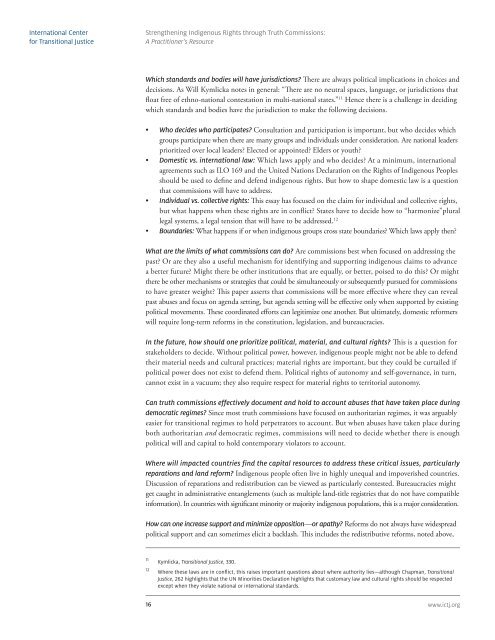Strengthening Indigenous Rights through Truth Commissions: A ...
Strengthening Indigenous Rights through Truth Commissions: A ...
Strengthening Indigenous Rights through Truth Commissions: A ...
- No tags were found...
You also want an ePaper? Increase the reach of your titles
YUMPU automatically turns print PDFs into web optimized ePapers that Google loves.
International Centerfor Transitional Justice<strong>Strengthening</strong> <strong>Indigenous</strong> <strong>Rights</strong> <strong>through</strong> <strong>Truth</strong> <strong>Commissions</strong>:A Practitioner’s ResourceWhich standards and bodies will have jurisdictions? There are always political implications in choices anddecisions. As Will Kymlicka notes in general: “There are no neutral spaces, language, or jurisdictions thatfloat free of ethno-national contestation in multi-national states.” 11 Hence there is a challenge in decidingwhich standards and bodies have the jurisdiction to make the following decisions.• Who decides who participates? Consultation and participation is important, but who decides whichgroups participate when there are many groups and individuals under consideration. Are national leadersprioritized over local leaders? Elected or appointed? Elders or youth?• Domestic vs. international law: Which laws apply and who decides? At a minimum, internationalagreements such as ILO 169 and the United Nations Declaration on the <strong>Rights</strong> of <strong>Indigenous</strong> Peoplesshould be used to define and defend indigenous rights. But how to shape domestic law is a questionthat commissions will have to address.• Individual vs. collective rights: This essay has focused on the claim for individual and collective rights,but what happens when these rights are in conflict? States have to decide how to “harmonize”plurallegal systems, a legal tension that will have to be addressed. 12• Boundaries: What happens if or when indigenous groups cross state boundaries? Which laws apply then?What are the limits of what commissions can do? Are commissions best when focused on addressing thepast? Or are they also a useful mechanism for identifying and supporting indigenous claims to advancea better future? Might there be other institutions that are equally, or better, poised to do this? Or mightthere be other mechanisms or strategies that could be simultaneously or subsequently pursued for commissionsto have greater weight? This paper asserts that commissions will be more effective where they can revealpast abuses and focus on agenda setting, but agenda setting will be effective only when supported by existingpolitical movements. These coordinated efforts can legitimize one another. But ultimately, domestic reformerswill require long-term reforms in the constitution, legislation, and bureaucracies.In the future, how should one prioritize political, material, and cultural rights? This is a question forstakeholders to decide. Without political power, however, indigenous people might not be able to defendtheir material needs and cultural practices; material rights are important, but they could be curtailed ifpolitical power does not exist to defend them. Political rights of autonomy and self-governance, in turn,cannot exist in a vacuum; they also require respect for material rights to territorial autonomy.Can truth commissions effectively document and hold to account abuses that have taken place duringdemocratic regimes? Since most truth commissions have focused on authoritarian regimes, it was arguablyeasier for transitional regimes to hold perpetrators to account. But when abuses have taken place duringboth authoritarian and democratic regimes, commissions will need to decide whether there is enoughpolitical will and capital to hold contemporary violators to account.Where will impacted countries find the capital resources to address these critical issues, particularlyreparations and land reform? <strong>Indigenous</strong> people often live in highly unequal and impoverished countries.Discussion of reparations and redistribution can be viewed as particularly contested. Bureaucracies mightget caught in administrative entanglements (such as multiple land-title registries that do not have compatibleinformation). In countries with significant minority or majority indigenous populations, this is a major consideration.How can one increase support and minimize opposition—or apathy? Reforms do not always have widespreadpolitical support and can sometimes elicit a backlash. This includes the redistributive reforms, noted above,1112Kymlicka, Transitional Justice, 330.Where these laws are in conflict, this raises important questions about where authority lies—although Chapman, TransitionalJustice, 262 highlights that the UN Minorities Declaration highlights that customary law and cultural rights should be respectedexcept when they violate national or international standards.16www.ictj.org
















